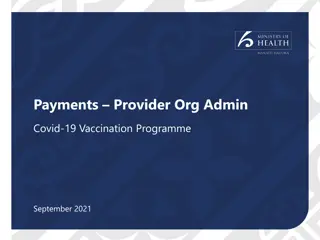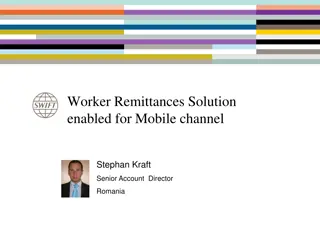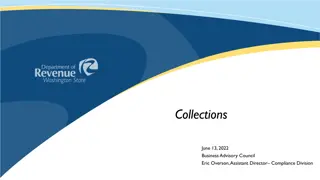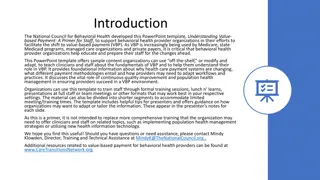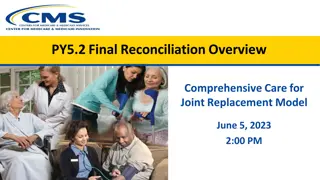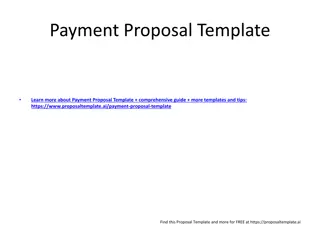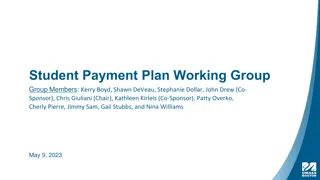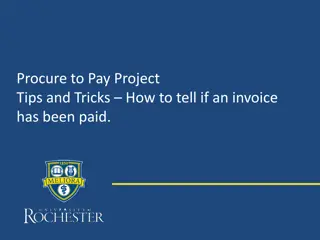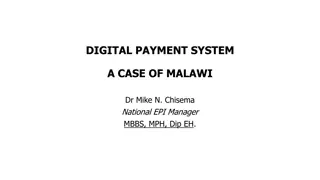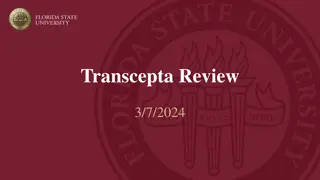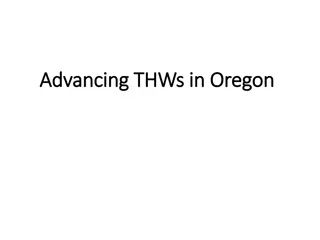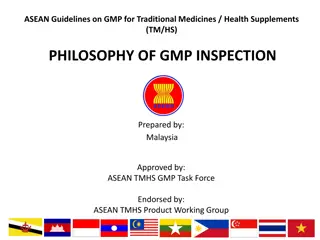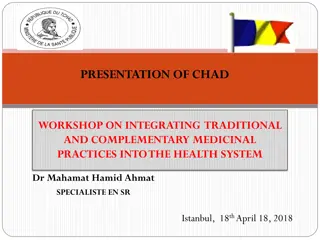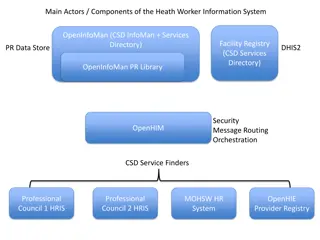Traditional Health Worker Payment Model Guidance Document Overview
The document provides guidance for integrating Traditional Health Workers (THWs) into health and social care systems, featuring insights from CCO interviews, case studies, and payment models like fee-for-service and value-based payments. It emphasizes supporting coordinated care organizations (CCOs), community-based organizations (CBOs), and health clinics to enhance THWs' roles effectively.
- Health Policy
- Payment Models
- Traditional Health Workers
- Coordinated Care
- Community-Based Organizations
Download Presentation

Please find below an Image/Link to download the presentation.
The content on the website is provided AS IS for your information and personal use only. It may not be sold, licensed, or shared on other websites without obtaining consent from the author. Download presentation by click this link. If you encounter any issues during the download, it is possible that the publisher has removed the file from their server.
E N D
Presentation Transcript
Traditional Health Worker Payment Model Guidance Document Summer Boslaugh (she/her) Senior Value-Based Payment Policy Advisor Transformation Center April 22, 2024 HEALTH POLICY AND ANALYTICS DIVISION
Agenda THW Payment Model Guidance Document overview CCO interview findings Case studies Summary of payment models Fee for service Direct employment Value-based payment Health-related services, Supporting Health for All Through RE-investment and in lieu of services Grant funding Links 2
Document overview Purpose Support coordinated care organizations (CCOs), community-based organizations (CBOs) and health clinics advance the integration of THWs into health and social care systems CCO interview findings about existing integration of THWs in their systems Case studies of THW payment models from CCOs in regions across the state Review various THW payment models Links to additional resources, including OHA billing guides and external resources by provider type 3 3 3 3
CCO interview findings In May 2023, OHA interviewed CCO staff to understand the state of partnerships with CBOs and clinics to provide THW services. Support for THWs in community-based organizations CCOs are working to build CBO capacity through supportive funding mechanisms. CCOs are developing payment models that support the work that CBOs are already doing in their communities. Blending payment models can help CCOs customize support for needed services. Support for THWs in clinical settings Capitation can provide flexibility for THWs who work as part of a clinical team. CCOs have a variety of ways that they incentivize clinics to work with THWs. 4 4 4 4
Case studies: community-based settings PacificSource s programmatic payment model CBOs with THWs offer: 1. One-on-one and group 2. Support to access social services JCC and CPCCO s sustainable payment model CBOs with THWs provide clients: 1. Intake services 2. Individualized support/navigation 3. Health education Encounter-based reimbursement for one-on-one and group THW services. Fee for service payment for intake and health education. This includes an amount for overhead to cover a portion of the THW program s overall costs. Per-member-per-month payment collaboratively determined for support and navigation. 5 5 5 5
Case studies: clinical settings Advanced Health s additional pay for primary care case management Umpqua Health Alliance s incentive for clinics that hire THWs Patient-Centered Primary Care Home (PCPCH) clinics hire THWs to provide case management Per-member-per-month payment paid to clinics for case management THWs work with nurses who provide clinical expertise $10,000 one-time incentive payment to clinics for each credentialed THW they hire Support clinics with upfront costs to hire and integrate THW into practice 6 6 6 6
Measuring THW impact Multiple program evaluations from across the country show strong evidence of improved quality and decreased costs resulting from the integration of THWs across provider types. Measuring the impact of THWs in real time is a challenge due to the absence of standardized measures specific to THWs. CCOs are measuring the: o number of members served, o types of services provided, o submission of member satisfaction survey results, o participation in the closed loop referral platform Unite Us / Connect Oregon, and o THW workforce demographics, trainings, and certification. CCOs anticipate incorporating quality measures as the work evolves. 7 7 7 7
Payment models Considerations for selecting a payment model Community assets and needs Organizational capacity and needs THW capacity Demand for THW services Availability of funding Payment models Fee for service Direct employment Value-based payment Alternative payment Health-related services, Supporting Health for All Through RE- investment and in lieu of services Grant funding 8
Fee for service (FFS) Itemized reimbursement for specific individual services provided. About Detailed tracking of services via claims data Data generated supports the case for integration into traditional health systems Benefits Requires THWs and organizations to track services in specific ways, increasing administrative burden Limited services available for reimbursement Organization must have capacity to bill for services Challenges Benefits realized most efficiently when organization already has Medicaid billing capacity Third-party billing may expand capacity for organizations to bill for services Partnership considerations 9 9 9 9
Direct employment Employ a THW as a regular staff member. About Flexibility to design program and services Employment benefits for THW Possibility for THW to be more easily integrated into existing care team Benefits Funding position in operational or administrative budget may be prohibitively expensive Challenges Likely requires braiding multiple funding streams May be employed by CCO, CBO, clinic or hospital Partnership considerations 10 10 10 10
Value-based payment (VBP)* Payment to providers that explicitly rewards the value produced by the service to a member and supports flexibility in where, how, and by whom care is delivered. About Incentivizes quality care provision Flexibility to pay for non-billable services Promotes team-based care May support CCOs in reaching VBP targets Requires quality tracking and reporting between CCO and CBO, may add administrative burden Benefits Challenges Quality metrics for THW services must be defined and tracked Partnership considerations * Infrastructure payments and pay for reporting are not VBPs but are supportive of THWs and can be paid in addition to FFS or added to a VBP to provide additional flexibility. 11 11 11 11
Health-related services (HRS) Non-covered services that complement covered services; two types: flexible services for individual members, community benefit initiatives for population health improvement. About Flexible services can fund continuation of THW services beyond what is covered Ability to fund THW programs offering non-covered services through community benefit initiatives Benefits Only for non-covered services HRS cannot be tied to other administrative requirements Cannot be used for infrastructure or administrative costs Challenges May be valuable to define specific services that do qualify as HRS upfront Partnership considerations 12 12 12 12
Supporting Health for All Through RE-investment (SHARE) Initiative About Requirement for CCOs to invest some of their profits into their communities. Investments must address health equity and the social determinants of health and equity (SDOH-E). Can be used for THW training and education Potential for lighter reporting burden on CBOs and THWs compared with other funding streams as individual services may not need to be tracked and reported on Benefits All funding decisions must be tied to at least one specific domain of the SDOH-E Often offered to organizations as grant funding, in which case the organization needs to apply for SHARE funds for THW programs Challenges Understanding CCO process for SHARE funding is important for partner organizations Funding must align with community health improvement plans and address specific domains of SDOH-E Partnership considerations 13 13 13 13
In lieu of services Pre-determined medically appropriate and cost-effective substitutes for covered services or settings. About THWs can offer certain covered services they re not otherwise able to bill for THWs may provide services outside of traditional settings CCOs may collect a limited dataset for ILOS claims, reducing CBO administrative burden Clinical supervision is not required; CCOs have authority to determine standards of care Benefits Must be developed and approved by the state prior to implementation Services offered as ILOS must be available to all members who qualify Currently only available for community health worker services in an alternative setting Challenges Partnership between CCO and CBO must be developed well before beginning to offer services CCOs are not required to offer ILOS Partnership considerations 14 14 14 14
Grant funding Time-limited, restricted or unrestricted funding, often from private foundations or governments. About More flexibility depending on the grantor May be paid as a lump sum up front for implementation prior to incurring expenses Benefits Less sustainable due to time-limited nature of grants May require research and effort to identify and apply for grant funding Challenges Grant funding opportunities vary widely in availability, frequency, requirements or restrictions and eligibility Partnership considerations 15 15 15 15
Traditional Health Worker Payment Model Guide Summer Boslaugh summer.h.boslaugh@oha.Oregon.gov 16 16 16 16




